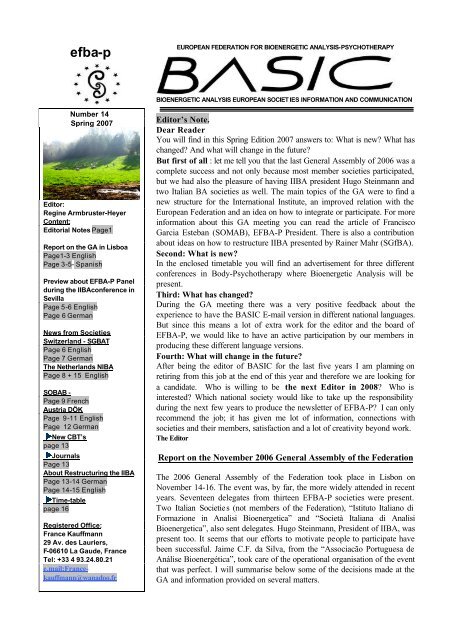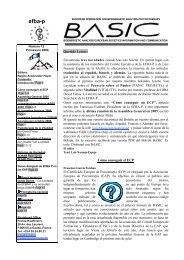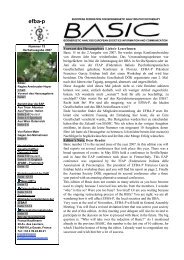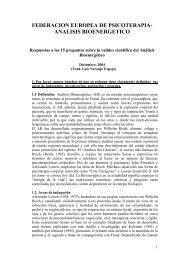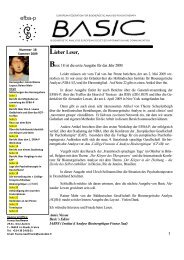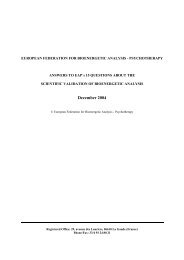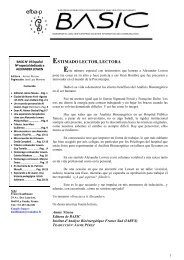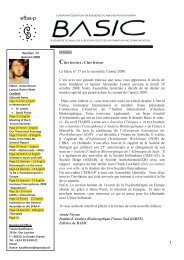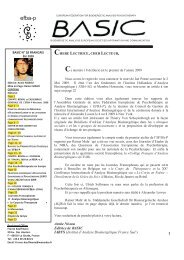efba-p - European Federation for Bioenergetic Analysis ...
efba-p - European Federation for Bioenergetic Analysis ...
efba-p - European Federation for Bioenergetic Analysis ...
Create successful ePaper yourself
Turn your PDF publications into a flip-book with our unique Google optimized e-Paper software.
<strong>efba</strong>-p<br />
Number 14<br />
Spring 2007<br />
Editor:<br />
Regine Armbruster-Heyer<br />
Content:<br />
Editorial Notes Page1<br />
Report on the GA in Lisboa<br />
Page1-3 English<br />
Page 3-5- Spanish<br />
Preview about EFBA-P Panel<br />
during the IIBAconference in<br />
Sevilla<br />
Page 5-6 English<br />
Page 6 German<br />
News from Societies<br />
Switzerland - SGBAT<br />
Page 6 English<br />
Page 7 German<br />
The Netherlands NIBA<br />
Page 8 + 15 English<br />
SOBAB -<br />
Page 9 French<br />
Austria DÖK<br />
Page 9-11 English<br />
Page 12 German<br />
New CBT’s<br />
page 13<br />
Journals<br />
Page 13<br />
About Restructuring the IIBA<br />
Page 13-14 German<br />
Page 14-15 English<br />
Time-table<br />
page 16<br />
Registered Office:<br />
France Kauffmann<br />
29 Av. des Lauriers,<br />
F-06610 La Gaude, France<br />
Tel: +33 4 93.24.80.21<br />
e.mail:Francekauffmann@wanadoo.fr<br />
EUROPEAN FEDERATION FOR BIOENERGETIC ANALYSIS-PSYCHOTHERAPY<br />
BIOENERGETIC ANALYSIS EUROPEAN SOCIET IES INFORMATION AND COMMUNICATION<br />
Editor’s Note.<br />
Dear Reader<br />
You will find in this Spring Edition 2007 answers to: What is new? What has<br />
changed? And what will change in the future?<br />
But first of all : let me tell you that the last General Assembly of 2006 was a<br />
complete success and not only because most member societies participated,<br />
but we had also the pleasure of having IIBA president Hugo Steinmann and<br />
two Italian BA societies as well. The main topics of the GA were to find a<br />
new structure <strong>for</strong> the International Institute, an improved relation with the<br />
<strong>European</strong> <strong>Federation</strong> and an idea on how to integrate or participate. For more<br />
in<strong>for</strong>mation about this GA meeting you can read the article of Francisco<br />
Garcia Esteban (SOMAB), EFBA-P President. There is also a contribution<br />
about ideas on how to restructure IIBA presented by Rainer Mahr (SGfBA).<br />
Second: What is new?<br />
In the enclosed timetable you will find an advertisement <strong>for</strong> three different<br />
conferences in Body-Psychotherapy where <strong>Bioenergetic</strong> <strong>Analysis</strong> will be<br />
present.<br />
Third: What has changed?<br />
During the GA meeting there was a very positive feedback about the<br />
experience to have the BASIC E-mail version in different national languages.<br />
But since this means a lot of extra work <strong>for</strong> the editor and the board of<br />
EFBA-P, we would like to have an active participation by our members in<br />
producing these different language versions.<br />
Fourth: What will change in the future?<br />
After being the editor of BASIC <strong>for</strong> the last five years I am planning on<br />
retiring from this job at the end of this year and there<strong>for</strong>e we are looking <strong>for</strong><br />
a candidate. Who is willing to be the next Editor in 2008? Who is<br />
interested? Which national society would like to take up the responsibility<br />
during the next few years to produce the newsletter of EFBA-P? I can only<br />
recommend the job; it has given me lot of in<strong>for</strong>mation, connections with<br />
societies and their members, satisfaction and a lot of creativity beyond work.<br />
The Editor<br />
Report on the November 2006 General Assembly of the <strong>Federation</strong><br />
The 2006 General Assembly of the <strong>Federation</strong> took place in Lisbon on<br />
November 14-16. The event was, by far, the more widely attended in recent<br />
years. Seventeen delegates from thirteen EFBA-P societies were present.<br />
Two Italian Societies (not members of the <strong>Federation</strong>), “Istituto Italiano di<br />
Formazione in Analisi <strong>Bioenergetic</strong>a” and “Società Italiana di Analisi<br />
<strong>Bioenergetic</strong>a”, also sent delegates. Hugo Steinmann, President of IIBA, was<br />
present too. It seems that our ef<strong>for</strong>ts to motivate people to participate have<br />
been successful. Jaime C.F. da Silva, from the “Associacão Portuguesa de<br />
Análise Bioenergética”, took care of the operational organisation of the event<br />
that was perfect. I will summarise below some of the decisions made at the<br />
GA and in<strong>for</strong>mation provided on several matters.
2<br />
An important issue this year was the reorganisation process under way in IIBA. Hugo Steinmann<br />
volunteered to attend our GA to in<strong>for</strong>m us in detail about this process, to answer questions, and to exchange<br />
points of views with delegates on this and other matters. The GA devoted an important amount of time to this<br />
issue and finally decided to support the principle of including regions, integrating the societies of their area, in<br />
the structure of IIBA. The details about the specific <strong>for</strong>m of that inclusion will need to be worked out. It was<br />
communicated at the meeting that representatives from societies of the North American/New Zealand<br />
Region had just met the previous weekend and decided to become organised in a regional structure analogous<br />
to those currently existing <strong>for</strong> the <strong>European</strong> and South American regions.<br />
Participants at the 2006 GA from left to right:<br />
Rainer Mahr (SGfBA) – Victor Sarmiento Gonzales-Nieto (SAAB) - Jocelyne Moulet-Farget ( SFABE) - Christa D.<br />
Ventling (SGBAT) Brigitte Berger (DOK) Heiner Steckel (NIBA-GER) Fina Pla I Vila (ACAB) – Dolores Boada<br />
(ACAB) – Hugo Steinmann (IIBA) – Annie Nissou (IABFS) – Guiseppe Carzedda (IFAB) – Rosaria Filoni (SIAB)<br />
Francisco García Es teban (SOMAB) – Liane Maathuis (NIBA-NL) – Jaime Perez García (EHABE) – France Kauffmann<br />
(IABFS) – Claudia Ucros (SOBAB) – Regine Armbruster-Heyer (Sobab) – Emilia Gallardo Pérez (SOMAB)<br />
There is currently a good atmosphere of communication and cooperation between the <strong>Federation</strong> and<br />
IIBA. IIBA has offered the <strong>Federation</strong> the possibility to organise events at the IIBA Conference in Seville. It<br />
was decided to participate in two such activities, one scientific (“The work with <strong>Bioenergetic</strong> <strong>Analysis</strong>:<br />
different accents, different paradigms?”) and other institutional (“Meeting with representatives of the<br />
<strong>European</strong> <strong>Federation</strong> – Goals <strong>for</strong> the future”).<br />
The relation with the <strong>European</strong> Association <strong>for</strong> Body Psychotherapy (EABP) has continued to<br />
strengthen. An agreement has been reached with EABP, by which members of our respective organisations<br />
will be able to attend the congresses organised by the other institution at the reduced fee offered to members.<br />
Additional ways of cooperation will be explored in the future.<br />
EFBA-P was present at the 2006 Congress of the <strong>European</strong> Association <strong>for</strong> Psychotherapy (EAP) with<br />
a workshop, a poster and a flyer about <strong>Bioenergetic</strong> <strong>Analysis</strong>. These resources are available to the societies
to be used as such, or as inspiration to develop analogous resources to be used on similar occasions. We are<br />
already present as a modality of psychotherapy in the web page of EAP. Ulrike Pschill, from the German-<br />
Austrian Society (DÖK), has accepted attending the EAP Vienna meetings representing EFBA-P.<br />
Communication with members through BASIC has been improved. There are more articles translated to<br />
more languages. In addition to the printed edition there are electronic versions in different languages that can<br />
be saved and used in the computer.<br />
Edith Liberman sent a report about our web page. Its design has continued to be improved and made more<br />
attractive. Its content has been updated. It was accepted to add new functionalities, which are currently<br />
under study, to make it even more useful to members and to the general public. Members will soon be able to<br />
place in the web page in<strong>for</strong>mation about the activities they organise. An edited version of BASIC is also<br />
available on the web.<br />
The possibility of creating different EFBA-P fees <strong>for</strong> members (depending on whether they are students,<br />
awaiting certification or CBTs) is been studied. It was considered that there was a need to know first the<br />
actual structure of societies regarding those categories be<strong>for</strong>e making a decision on that matter. That<br />
in<strong>for</strong>mation would provide an estimate of the impact that such change would have on the EFBA-P budget.<br />
The atmosphere of the GA was very relaxed and positive. I hope that all our endeavours help promote the<br />
diffusion of our modality in the general public and within our colleagues, foster the communication with and<br />
among our members and provide useful tools <strong>for</strong> our work. I expect that in the coming year we continue<br />
advancing in functionally structuring and integrating our institutions and in offering ever more practical<br />
resources to the members of our societies.<br />
The minutes of the GA will soon be sent to societies. If you are interested in a more detailed report of the<br />
meeting please ask <strong>for</strong> them to the delegate of your society or to an EC member.<br />
Francisco García Esteban<br />
President of EFBA<br />
In Spanish<br />
In<strong>for</strong>me sobre la Asamblea General de la<br />
Federación Europea de Noviembre de 2006<br />
(Por Francisco García, Presidente de la Federación)<br />
La Asamblea General de 2006 de la Federación<br />
tuvo lugar en Lisboa del 14 al 16 de noviembre. El<br />
evento fue, con mucho, el que contó con una<br />
mayor asistencia de los últimos años. Diecisiete<br />
delegados de trece sociedades de la EFBA-P<br />
estuvieron presentes. Dos sociedades italianas (no<br />
miembros de la federación), "Istituto Italiano di<br />
Formazione en Analisi <strong>Bioenergetic</strong>a" y "Società<br />
Italiana di Analisi <strong>Bioenergetic</strong>a", enviaron también<br />
delegados. Hugo Steinmann, Presidente del IIBA,<br />
también asistió. Parece que nuestros esfuerzos<br />
para motivar la participación han dado resultado.<br />
Jaime C.F. da Silva, de la "Associacão Portuguesa<br />
de Análise Bioenergética", se ocupó de la<br />
organización operativa de la reunión, que resultó<br />
perfecta. Resumiré a continuación algunas de las<br />
decisiones que se tomaron en la AG así como<br />
in<strong>for</strong>mación que se ofreció sobre temas diversos.<br />
Un asunto importante este año era el proceso de<br />
reorganización actualmente en marcha en el<br />
IIBA. Hugo Steinmann se ofreció a asistir a<br />
nuestra AG para in<strong>for</strong>marnos en detalle sobre este<br />
proceso, responder a preguntas, e intercambiar<br />
3
4<br />
puntos de vista con los delegados sobre éste y<br />
otros temas. La AG dedicó una cantidad<br />
considerable de tiempo a esta cuestión y<br />
finalmente decidió respaldar el principio de incluir<br />
a las regiones, que integran a las sociedades de su<br />
área geográfica, en la estructura del IIBA. Habrá<br />
que concretar los detalles sobre la <strong>for</strong>ma<br />
específica que tendría esa inclusión. Se comunicó<br />
en la reunión que representantes de sociedades de<br />
la región de Norteamérica/Nueva Zelanda se<br />
habían reunido el fin de semana anterior y habían<br />
decidido organizarse en una estructura regional<br />
análoga a las actualmente existentes en las<br />
regiones europea y sudamericana.<br />
Actualmente existe una buena atmósfera de<br />
comunicación y cooperación entre la Federación<br />
y el IIBA. El IIBA ha ofrecido a la Federación la<br />
posibilidad de organizar eventos en el Congreso del<br />
IIBA en Sevilla. Se decidió participar con dos<br />
actividades, una científica ("El trabajo con Análisis<br />
Bioenergético. ¿Acentos diferentes o paradigmas<br />
diferentes?") y otra institucional ("Reunión con<br />
representantes de la Federación Europea -<br />
Objetivos para el futuro").<br />
La relación con la Asociación Europea para la<br />
Psicoterapia Corporal (EABP) ha continuado<br />
<strong>for</strong>taleciéndose. Se ha llegado a un acuerdo con la<br />
EABP, por el que los miembros de nuestras<br />
organizaciones respectivas podrán asistir a los<br />
congresos organizados por la otra institución, con<br />
los honorarios reducidos ofrecidos a miembros. Se<br />
explorará la posibilidad de otras <strong>for</strong>mas de<br />
cooperación en el futuro.<br />
La EFBA-P estuvo presente en el Congreso de<br />
2006 de la Asociación Europea para la<br />
Psicoterapia (EAP) con un taller, un póster y un<br />
folleto sobre el análisis Bioenergético. Estos<br />
recursos están disponibles para ser usados como<br />
tales, o simplemente como fuentes de inspiración<br />
para desarrollar recursos análogos que puedan ser<br />
utilizados por las sociedades en ocasiones<br />
similares. Ya estamos presentes en la página web<br />
de la EAP como una modalidad específica de<br />
psicoterapia. Ulrike Pschill, de la sociedad<br />
austriaco-alemana (DÖK), ha aceptado asistir a<br />
las reuniones de la EAP en Viena representando a<br />
la EFBA - P.<br />
La comunicación mediante BASIC con los<br />
miembros ha sido mejorada. Hay más artículos<br />
traducido a más lenguas. Además de la edición<br />
impresa hay versiones electrónicas en idiomas<br />
diferentes que pueden ser guardadas y utilizadas<br />
en el ordenador.<br />
Edith Liberman envió un in<strong>for</strong>me sobre nuestra<br />
página web. Su diseño ha continuado mejorando y<br />
se ha hecho más atractivo. Su contenido ha sido<br />
actualizado. Se aceptó añadir nuevas<br />
funcionalidades, que están actualmente bajo<br />
desarrollo, para hacerla aun más útil a los<br />
miembros y al público en general. Los miembros<br />
podrán pronto colocar en la página web<br />
in<strong>for</strong>mación sobre las actividades que organicen.<br />
Una versión editada de BASIC está también<br />
disponible en la red.
Se estudió la posibilidad de crear cuotas<br />
diferentes de la EFBA-P para distintas clases<br />
de miembros (dependiendo de si son estudiantes,<br />
aguardan la certificación o son CBTs). Se<br />
consideró que era necesario conocer la estructura<br />
real de las sociedades respecto a esas categorías<br />
antes de tomar una decisión sobre este tema. Esa<br />
in<strong>for</strong>mación suministraría una estimación<br />
aproximada del impacto que tal cambio tendría<br />
sobre el presupuesto de la EFBA-P.<br />
La atmósfera de la AG fue muy relajada y<br />
positiva. Espero que nuestros esfuerzos ayuden a<br />
promover la difusión de nuestra modalidad entre el<br />
público general y entre nuestros colegas,<br />
promuevan la comunicación con y entre nuestros<br />
miembros y generen herramientas útiles para<br />
nuestro trabajo. Confío en que en el próximo año<br />
continuaremos avanzando en la estructuración e<br />
integración funcional de nuestras instituciones y en<br />
el desarrollo de recursos cada vez más útiles para<br />
los miembros de nuestras sociedades.<br />
Las actas de la AG serán pronto enviadas a las<br />
sociedades. Aquellas personas interesadas en un<br />
in<strong>for</strong>me más detallado de la reunión pueden<br />
solicitarlas al delegado de su sociedad o a los<br />
miembros del CE.<br />
Francisco García Esteban<br />
Presidente de la EFBA – P<br />
EFBA-P creates a panel about basic<br />
bioenergetic issues at the IIBA -<br />
Conference in Seville<br />
By Rainer Mahr<br />
While developing further <strong>Bioenergetic</strong> <strong>Analysis</strong> by<br />
many of our colleagues its understanding will<br />
change too by the accentuation of different<br />
aspects of the bioenergetic concept. There<strong>for</strong>e<br />
sometimes you are not sure whether you are<br />
talking of the same issue exchanging your<br />
experiences and ideas with colleagues. But there<br />
is no committee authorized to set a canon of what<br />
<strong>Bioenergetic</strong> <strong>Analysis</strong> will mean today and in the<br />
future. This can only be done by exchange and<br />
permanent communication.<br />
There<strong>for</strong>e the EFBA-P uses the opportunity at the<br />
Conference in Seville to organizes a special<br />
workshop discussing some basic assumptions of<br />
BA<br />
It is supported by one moderator only. Four<br />
colleagues will make an input of a specific issue to<br />
start an exchange and discussion among the<br />
participants.<br />
It is not a question of right or wrong but of<br />
different or common meanings. And perhaps we<br />
will discover important questions which can be<br />
studied in the next future.<br />
Moderator:<br />
Anja von der Schrieck – Junker<br />
Presenters of inputs:<br />
Angelika Schretter:<br />
Charakterstructures<br />
Christa Ventling:<br />
Bodyreading<br />
Claudia Ucros:<br />
BA - a process of self regulation<br />
Rainer Mahr:<br />
The functional identity of body and mind<br />
5
6<br />
After the congress we will evaluate the<br />
experiences and try to establish similar discussions<br />
on the <strong>European</strong> or the national level. Such a work<br />
could foster our knowledge of different<br />
understanding of BA and the creative manner to<br />
work with.<br />
In Deutsch:<br />
Die EFBA–P entwickelt für die Konferenz in<br />
Sevilla ein Forum, um über grundlegende<br />
bioenergetische Konzepte zu diskutieren.<br />
Von Rainer Mahr<br />
Indem sich die Bioenergetische Analyse weiter<br />
entwickelt, ändert sich für viele Kolleginnen und<br />
Kollegen auch ihr Selbstverständnis durch die<br />
unterschiedliche Betonung verschiedener Aspekte<br />
des bioenergetischen Konzepts. Man kann deshalb<br />
nicht immer sicher sein, ob man wirklich noch das<br />
Gleiche meint, wenn man sich mit Kolleginnen und<br />
Kollegen über die Arbeit austauscht. Es gibt aber<br />
auch kein autorisiertes Gremium, das festlegen<br />
kann, was die Bioenergetische Analyse ist und in<br />
Zukunft sein soll. Ein gemeinsames Verständnis<br />
kann nur durch einen regelmäßigen Austausch<br />
erreicht werden.<br />
Deshalb nutzt die EFBA – P die Konferenz in<br />
Sevilla für die Organisation eines speziellen<br />
Workshops, um solche Fragen zu diskutieren.<br />
Geleitet wird der Workshop nur von einem<br />
Moderator. Vier Kolleginnen und Kollegen werden<br />
zu bestimmten Themen kurze Stellungnahmen<br />
geben, um eine Diskussion unter allen Teilnehmern<br />
anzuregen.<br />
Es geht nicht um richtig oder falsch, sondern um<br />
die Erkundung unterschiedlicher und gemeinsamer<br />
Vorstellungen. Vielleicht tauchen dabei wichtige<br />
Fragen auf, die wir dann in der Zukunft erörtern<br />
und bearbeiten können.<br />
Moderator:<br />
Anja van der Schrieck - Junker<br />
Referenten:<br />
Angelika Schretter:<br />
Charakterstrukturen<br />
Christa Ventling:<br />
Körperlesen<br />
Claudia Ucros :<br />
BA - ein Prozess der Selbstregulation<br />
Rainer Mahr:<br />
Funktionale Identität vorn Körper, Seele<br />
Geist<br />
Nach dem Kongress wollen wir die Erfahrungen<br />
auswerten und versuchen, ähnliche Diskussionen<br />
auf der europäischen oder nationalen Ebene zu<br />
entwickeln. So eine Arbeit könnte unser Wissen<br />
über unterschiedliche bioenergetische<br />
Vorstellungen und die kreativen Arbeitsweisen<br />
unserer Kolleginnen und Kollegen vertiefen.<br />
NEWS FROM THE SOCIETIES<br />
25th anniversary of the SGBAT(Swiss<br />
Society of <strong>Bioenergetic</strong> <strong>Analysis</strong> and<br />
Therapy )<br />
By Suzanne Pellaux<br />
In October SGBAT celebrated its 25th year of<br />
foundation and invited their members and<br />
interested persons to its two-day anniversary. In<br />
the seminar-hotel Schuetzen in Rheinfelden<br />
(Switzerland) therapists from different branches<br />
presented their therapeutic concepts. The theme<br />
of the event was:" The interrelation of symptoms<br />
and relationship" .This was discussed from<br />
different points of view. Additional workshops<br />
served <strong>for</strong> deeper understanding.<br />
Thomas Ehrensperger produced some relaxed<br />
laughter in the audience when he presented his<br />
memories and fotos about the 25 years of<br />
SGBAT.
Rheinfelden /Switzerland<br />
On the basis of an article of Angela Klopstech the<br />
body interventions in their different meaning <strong>for</strong><br />
the therapeutically relationship were presented by<br />
Gisela Worm. She differentiated <strong>for</strong>ms of a body -<br />
centered and relationship-or transference-centered<br />
the connected advantages and disadvantages of<br />
these points of departure.<br />
The very personal philosophy of Hermann Schmitz<br />
and its use <strong>for</strong> psycosomatic was discussed by<br />
Wolf Langewitz and put into precise notes about<br />
pulsation (contraction and expansion).<br />
Peter Schindler led througt the extremely<br />
sensible initial time of an unborn and showed how<br />
pregnancy and childbirth influences the quality of<br />
pre- and perinatal attachment.<br />
The stages of <strong>for</strong>ming of therapeutic relation were<br />
demonstrated in her lecture by Ursula Hermani.<br />
After this concentrated theoretical input the<br />
corporeal pleasure was put into the center.In the<br />
salt-spring pool of the hotel the participants<br />
enjoyed the warm water and digested the lectures.<br />
Another climax of the anniversary was a dinner<br />
with several dishes and music to dance.<br />
The second day was opened by Marulla<br />
Hauswirth with a very personal lecture about her<br />
development to a body-therapist.<br />
Her conclusion was that a differentiated feeling of<br />
the body reacts on the therapeutic work.<br />
Finally Peter Peiser gave an overview about the<br />
systemic perspectives.<br />
The wide panel of lectures showed the vividness<br />
and many-sidedness of SGBAT activities after 25<br />
years of its existence.<br />
All lectures can be opened on www.sgbat.ch.<br />
Translation into English: Christa Keller<br />
In Deutsch:<br />
25-jähriges Jubiläum der SGBAT (=<br />
Schweizerische Gesellschaft für<br />
bioenergetische Analyse und Therapie)<br />
Von Suzanne Pellaux<br />
Die SGBAT feierte im Oktober ihr 25-jähriges<br />
Bestehen und lud dazu ihre Mitglieder und<br />
Interessierte zu einer 2-tägigen<br />
Jubiläumsveranstaltung ein. Im Seminarhotel<br />
Schützen in Rheinfelden stellten Therapeuten und<br />
Therapeutinnen unterschiedlicher Ausrichtung ihre<br />
Therapiekonzepte vor. Aus verschiedenen<br />
Perspektiven wurde der Tagungstitel „im<br />
Wechselspiel vom Symptom und Beziehung“<br />
beleuchtet und diskutiert. Anschliessende<br />
Workshops dienten der Vertiefung.<br />
Heitere Lacher lockte Thomas Ehrensperger<br />
aus dem Publikum hervor, als er in alten Fotos und<br />
persönlichen Erinnerungen die 25 Jahre SGBAT<br />
nochmals auferstehen liess.<br />
Gisela Worm stellte, ausgehend von einem<br />
Artikel von Angela Klopstech, die<br />
Körperinterventionen in ihrer unterschiedlichen<br />
Bedeutung für die therapeutische Beziehung dar.<br />
Sie unterschied dabei Formen eines<br />
körperselbstzentrierten Ansatzes und einen<br />
beziehungs- oder übertragungszentrierten Ansatz<br />
und zeigte auf, welche Vor- und Nachteile diese<br />
unterschiedlichen Zugänge haben.<br />
Die Leibphilosphie von Hermann Schmitz und ihr<br />
Nutzen für die Psychosomatik wurde von Wolf<br />
Langewitz ausgeführt und mit den Begriffen der<br />
Engung und Schwellung konkretisiert.<br />
Peter Schindler führte durch die extrem sensible<br />
Anfangszeit eines entstehenden Lebewesens und<br />
zeigte auf, wie Schwangerschaft und Geburt die<br />
Qualität der prä- und perinatalen<br />
Bindungsbeziehung beeinflussen können.<br />
Ursula Hermani zeigte in ihrem Referat die<br />
Formungsstadien der therapeutischen Beziehung<br />
auf.<br />
Nach diesem geballten theoretischen Input rückte<br />
zum Glück das leibliche Wohl in den Vordergrund.<br />
Im angrenzenden Solbad konnte man im angenehm<br />
warmen Wasser planschend die Referate<br />
verdauen. Das mehrgängige Jubiläumsdinner und<br />
7
8<br />
die anschliessende Tanzmusik waren ein weiterer<br />
Höhepunkt.<br />
Den zweiten Tag eröffnete Marulla Hauswirth<br />
mit einem sehr persönlich gehaltenen Referat, das<br />
ihre Entwicklung als Körperpsychotherapeutin<br />
reflektierte. Ein verändertes Körpergefühl, so ihr<br />
Fazit, wirkt auf die therapeutische Arbeitsweise<br />
zurück.<br />
Den Abschluss schliesslich bildete Peter Peiser<br />
mit einem Überblick über die systemischen<br />
Perspektiven.<br />
Die breite Palette der Beiträge zeigte die<br />
Lebendigkeit und Vielseitigkeit der SGBAT nach<br />
25 Jahren Bestehen. Alle Referate sind einsehbar<br />
auf www.sgbat.ch.<br />
News from the NIBA-The Netherlands<br />
NIBA celebrates 25th anniversary!<br />
By Jacqueline van Driel<br />
Saturday 18th of November 2006, the Dutch<br />
society NIBA celebrated her 25th anniversary.<br />
More than 60 members of NIBA and introduces<br />
were welcomed by the so called Lustrumcommission<br />
in a <strong>for</strong>mer monastery in the country<br />
side right in the middle of The Netherlands.<br />
The overall theme of the day was ‘Connection`.<br />
Through this theme the executive committee<br />
wanted members feeling more connected to<br />
oneself and to each other, both within educational<br />
groups as well between members of different<br />
groups. Members also were given the opportunity<br />
to contribute to the celebration as a way to<br />
express their own way feeling connected with<br />
colleagues.<br />
The program of the day was quite varied. The day<br />
started with a ceremony to gave express to the<br />
theme `Connection`. After this, Jan Ponne, one of<br />
the `founding fathers` of NIBA gave a speech,<br />
through with members were deeply touched.<br />
Thereafter Jan also played an impressive piece of<br />
music, The Elegiè van Serge Rachmaninoff, again<br />
members were touched.<br />
Thereafter, the members of NIBA that have died<br />
over the years were also remembered through a<br />
ceremony of calling their names whilst lightening<br />
candles, all of this guided by the lovely music of<br />
Vicky Brown.<br />
After this, June McDonach held the speech that<br />
David Campbell was supposed to give.<br />
Un<strong>for</strong>tunately, David was not able to join in the<br />
celebration, due to a serious knee-infection.<br />
Through the words June spoke, everybody felt<br />
deeply connected with David, his spirit was<br />
around.<br />
At the end of the morning, NIBA-members<br />
Helena Kwaaitaal and Greetje Salomons became<br />
certified Bio-energetic Therapists and they<br />
received their certificates. Lovely speeches were<br />
held and flowers and gifts were given to them.<br />
In the afternoon, a music-workshop was given by<br />
Lieneke Molag and Maurice Willems, both voicetherapists<br />
from outside NIBA. Everybody joined<br />
this lovely workshop and through the singing joy<br />
and happiness were created. Thereafter, the<br />
newly started educational group 9 invited all people<br />
<strong>for</strong> a ceremony with the `NIBAlloons` as a way to<br />
think over the future. Wishes people had written<br />
down were fixed to balloons and released;<br />
beautifully the balloons flew away against a blue<br />
sky.<br />
After this, three different workshops were held at<br />
the same time, people had to enrol <strong>for</strong> one to<br />
attend. Elly Meyles and Willem Poppeliers of<br />
NIBA and June McDonach gave workshops and<br />
all attendees were very satisfied and touched by<br />
the work.<br />
Be<strong>for</strong>e a lovely dinner, Regina Axt, a <strong>for</strong>mer<br />
president of NIBA, gave a beautiful per<strong>for</strong>mance.<br />
She was guided by a violist and a pianist and sang<br />
a cantata of the aria "angenehmer Zephirus".<br />
After diner it was time to relax whilst listening to<br />
calm music sang by Karin Menken, a woman who<br />
worked at the conference-center. At the end of<br />
this people were ready <strong>for</strong> a tango-workshop,<br />
given by a student of NIBA and her husband. The<br />
theme `Connection` was beautiful demonstrated by<br />
them and through the tango-exercises participants<br />
felt the power of the tango!<br />
A disco thereafter gave people opportunity to<br />
dance freely, a lot of joy and pleasure was shared.
At the end of the day, all participants felt very<br />
satisfied and deeply connected with each other.<br />
There are two other highlights that need to be<br />
mentioned. One is the start of a new training<br />
group, the 9th, in September 2006. A lot of<br />
activities were undertaken and many NIBAmembers<br />
were involved in this. Secondly, Tanja<br />
Mars, the first student of training group 8, received<br />
her certificate and became a CBT.<br />
In French<br />
News from the Belgian Society<br />
Nouvelles de la Sobab (société belge<br />
d’Analyse Bioénergétique) :<br />
En commençant cet article, je me suis demandé ce<br />
que je pourrais bien vous écrire. Et j’ai pensé<br />
alors que ce qui peut intéresser c’est bien<br />
évidemment ce que nous faisons et qui donne de<br />
l’énergie à la société. Alors voilà :<br />
Le travail (toujours bénévole pour la société), qui<br />
au départ et pendant bien longtemps reposait sur<br />
peu d’épaules, est aujourd’hui partagé entre<br />
beaucoup de membres. C’est le résultat de<br />
l’augmentation du nombre de membres d’une part,<br />
et de la condition qui se trouve dans nos statuts de<br />
l’obligation d’être « actif » dans la société.<br />
Cette répartition du travail nous permet d’avoir<br />
pour la partie gestion: un bon conseil<br />
d’administration, une Commission de Formation, un<br />
petit groupe qui gère notre site et une Commission<br />
d’Ethique. Pour la partie <strong>for</strong>mation continuée,<br />
nous avons deux groupes de « praticiens » (les<br />
CBT d’une part et les membres en voie de<br />
certification d’autre part) et un groupe de<br />
superviseurs. Les participants à ces groupes se<br />
réunissent entre 6 et 8 fois par an pour travailler<br />
ensemble.<br />
Les membres des groupes de « Praticiens »<br />
partagent leur travail en rapport avec des « cas »<br />
(plus ou moins difficiles) et échangent sur des<br />
sujets importants concernant la thérapie. Les<br />
membres du groupe des superviseurs s’entraînent<br />
à la supervision, échangent à ce sujet et sur la<br />
théorie, et vont approfondir leurs connaissances<br />
durant deux week-ends de travail placés fin 2007<br />
et fin 2008.<br />
Une dizaine de membres de notre société vient<br />
d’assister à deux week-ends de <strong>for</strong>mation animés<br />
par le Dr. Vita Heinrich-Clauer et le Dr. Jörg<br />
Clauer, centrés sur l’apprentissage du travail<br />
thérapeutique en Analyse Bioénergétique avec des<br />
couples. Ces week-ends ont été passionnants tant<br />
niveau connaissance de la technique que du travail<br />
personnel, avec beaucoup de rires en prime !!<br />
Le groupe Sobab 8 termine sa <strong>for</strong>mation, le groupe<br />
Sobab 9 termine sa deuxième année de <strong>for</strong>mation,<br />
et nous entamons la sélection du groupe qui sera<br />
Sobab 10 !<br />
Voilà, tout ceci pour vous dire que nous allons<br />
vraiment bien pour le moment... et vous souhaitons<br />
de même.<br />
Colette Maskens<br />
DÖK – CONFERENCE in Hinterstoder,<br />
Upper Austria<br />
Sept. 28th – 30 th - 2007<br />
Walking on the Ridge – Working on the<br />
Spine<br />
With the concepts of <strong>Bioenergetic</strong> <strong>Analysis</strong> we<br />
will deal with topics like balance, backing, posture,<br />
getting upright and achieving an overview.<br />
„Nature itself and thus also human being is the<br />
center <strong>for</strong> conservation, change and<br />
development in organisations, societies and<br />
groups. “<br />
Waldefried Pechtl<br />
PREVIEW<br />
9
10<br />
Friday, Sept.28 th<br />
Balance, Backing and Support<br />
8.00 Pre-Workshop Brigitte Berger/Michael<br />
Bilic<br />
Hike to the „Schrocken“<br />
Saturday, Sept.29 th<br />
Posture<br />
Between heaven and<br />
earth<br />
7.00 – 7.30<br />
exercises Joachim<br />
Nagele<br />
9.00 Lecture<br />
Georg Wögerbauer<br />
10.15 – 12.30<br />
workshops I<br />
Getting Upright<br />
15.00 Lecture<br />
Waldemar Kufner<br />
Developmental steps concerning aggression and<br />
eros in bioenergetic analysis<br />
16.00 – 18.30 workshops II<br />
21.0 Dance<br />
Sunday, Sept. 30 th<br />
Overview and Balance<br />
7.00 – 7.30 exercises Joachim Nagele<br />
9.00 Lecture Susanna Schenk/Joachim<br />
Nagele The concept of love in the<br />
psychotherapeutic work<br />
10.00 – 12.00 workshops III<br />
12.30 – 13.00 closure<br />
Short description of lectures, workshops and<br />
contributions:<br />
Friday, Sept.28 th Balance, Backing and Support<br />
Pre-Workshop: Brigitte Berger/Michael Bilic<br />
Mountain hike to the „Schrocken“<br />
We approach the mountain ridge. A hike in nature<br />
with analogies and psychological tasks.<br />
Hiking clothes (-shoes) necessary.<br />
Hanspeter Eisendle:<br />
Walking on the ridge, from the view of a<br />
mountain guide<br />
Main profession: mountain guide. He spent most of<br />
his time in the mountains all over the world and<br />
became an excellent and experienced<br />
mountaineerer and climber. He climbs in order to<br />
avoid falling. He is sure that life outside is better<br />
than indoors. His philosophy: if I cannot do as I<br />
like, I like the way I can do.<br />
Eva Kammerer-Pinck<br />
Backing and support:<br />
Lecture<br />
Leaders are used to face and overcome crises in a<br />
decisive way. In describing a complex coaching<br />
process it becomes obvious, how the leader of an<br />
organisation, after loosing the backing of his<br />
organisation and in the consequence – after the<br />
breakdown of his own support system – in using<br />
the character structures, manages to activate his<br />
resources and to get back to his upright position.<br />
Workshop<br />
A demonstration of body interventions, which<br />
promote back support.<br />
Silvia Bengesser, Eva Maria Plank, Sabine<br />
Prewein<br />
Exhibition<br />
Thoughts on the <strong>European</strong> ways of life as<br />
emotional support <strong>for</strong> bioenergetic concepts.<br />
Backing and supports. Body, soul, mind, psyche<br />
and soma – an old song, a beautiful song.<br />
Cabaret Michael Bilic/Michael Schorr<br />
The ridge-hiking spine<br />
Brandnew scientific ideas from the fields of<br />
psychotherapy, emerging from our brain- and<br />
bodystorming workshop in the light of the global<br />
political situation.<br />
Georg Wögerbauer<br />
Lecture and workshop<br />
Between heaven and earth<br />
Homo erectus – auto-mobil?<br />
Taking the spine as an example, I will show ways<br />
to diagnosis and treat from the view of<br />
bioenergetic analysis and general medicine. Back<br />
pain problems are frequently combined with so<br />
called „new“ diseases – such as stress, burn out,<br />
fatigue syndrome, fear, depression, and sleeping<br />
disorder. The concept of character structures of<br />
bioenergetic analysis and the numerous possibilities<br />
of body therapy to work on getting upright, on the<br />
expression, on the movement and in consequence<br />
on the development of man are presented, and the<br />
necessity of an integrative concept of treatment<br />
will be demonstrated.
Brigitte Pototschnig/Dominik Pesendorfer<br />
Workshop<br />
Posture in life and work<br />
The culture of an organisation – individually and<br />
collectively – determines our behaviour, our<br />
feelings, our thought patterns , and our values.<br />
How does it express itself in individual postures?<br />
Where can we see analogies, abysses and heights<br />
in the context of the individual and the<br />
organisation?<br />
A bioenergetic-analytic discovery of the body<br />
worlds of your own work and organisation.<br />
Hubert Feurstein – workshop<br />
Running and getting upright<br />
Getting upright has a direction. To get upright<br />
means adjusting to the ground, in relation to gravity<br />
and the body. In this workshop we will try out and<br />
reflect on different aspects of getting upright by<br />
the means of body exercises and outdoor running.<br />
Please bring along com<strong>for</strong>table clothes and running<br />
shoes.<br />
Waldemar Kufner –<br />
Lecture and workshop<br />
Developmental steps concerning aggression<br />
and eros in bioenergetic analysis<br />
In the therapeutic relationship we meet <strong>for</strong>ces,<br />
which tend to extend the limits of contact<br />
continuously towards pleasureful encounter and<br />
ecstasy. In finding examples in the fields of visual<br />
arts, we have the opportunity of getting authentic<br />
in<strong>for</strong>mation and a view of the crazy realities of<br />
eros, which, in every day life, we are<br />
(un<strong>for</strong>tunately!) bound to get back to normal.<br />
Wolfgang Schmetterer<br />
Workshop<br />
<strong>Bioenergetic</strong> analysis in organisations<br />
Application of bioenergetic-analytical principles in<br />
practical work with organisations will be<br />
presented, and the opportunity to experience it will<br />
be offered in this workshop.<br />
The balance between fixed structures and mobility,<br />
the values of conservation and development will<br />
become visible. The main topic in this workshop<br />
will be the value of sincerity (being upright) in<br />
organisations and keeping up certain basic values.<br />
Christine Pechtl/Michael Schorr<br />
Workshop<br />
Borderline walk on the back<br />
A frame will be provided to enable the approach<br />
to our own borderline structures and strategies.<br />
11<br />
There is a saying that the body does not lie. Is our<br />
body sincere?<br />
We will work on the manifestations of borderline<br />
defence mechanisms on the spine, concerning the<br />
problems of getting upright and keeping balance.<br />
Susanna Schenk/Joachim Nagele<br />
Lecture<br />
The concept of love in the psychotherapeutic<br />
work<br />
This lecture is comparable with a balancing act,<br />
between ethics and methodology, between<br />
abstaining and finding the truth. The concept of<br />
love is frequently mentioned in the fields of culture,<br />
spirituality and history. In the<br />
psychotherapeutic/bioenergetic-analytical work we<br />
find it in the concepts of „being able to love“as a<br />
goal of therapy, and in transference.<br />
Workshop<br />
Characterstructure and dynamics of<br />
relationship – love stories<br />
Participants of this workshop get the opportunity to<br />
explore their own concepts of love, in the presence<br />
of their relationships. The model of character<br />
structures of bioenergetic analysis will be related<br />
to these experiences.<br />
Carola Kaltenbach<br />
Workshop<br />
To be alive – upright and well balanced<br />
Balance – stability – movement<br />
The spine gives stability. In the history of human<br />
evolution, the spine is the symbol of our upright<br />
position, in the history of the individual it is a<br />
symbol of identity. Distortion of the spine often<br />
goes back to severe traumatic experiences. Touch,<br />
working with posture and movement will help to<br />
feel different qualities of balance, and to realise<br />
how to get back support and how to connect our<br />
head with the ground by using the spine.<br />
Renate Schwenk/Hubert Feurstein<br />
Workshop<br />
Between you and me – what does contact<br />
mean?<br />
Contact is like walking on a tightrope. In this<br />
workshop we will bring together Martin Buber`s<br />
concept of „Begegnung“(encounter) with the<br />
concept of „Kontakt“(contact) in bioenergetic<br />
analysis. The nature in and around Hinterstoder<br />
will be our experimental field.<br />
Please bring along hiking shoes (or sneakers) and<br />
waterproof clothes.
12<br />
Gert Hock<br />
Workshop<br />
Running and biography<br />
I am just running – meaninglessly – the path is not<br />
the goal. But it is wonderful to feel the rhythm; it is<br />
slowly overflowing my whole body. The rhythm is<br />
overcoming this meaninglessness, and somewhere<br />
in my body I notice a little man`s voice. It whispers<br />
very softly, and by and by the voice gets louder<br />
and more comprehensible, and it makes me<br />
understand the sense of my running. Listen to the<br />
voice, try to remember these sentences, they may<br />
come somewhere out of your biography.<br />
Please bring along running shoes and rain coat<br />
(jacket).<br />
Agnes Neuenschwander Tarozzo<br />
Workshop<br />
Mobility of the spine and breathing<br />
We will try out movement, breath, voice, alone, in<br />
couples or in the group. We move, observe<br />
breathing and flexibility in the back, and we learn<br />
to treat ourselves with love and respect. With<br />
motivation, joy and discipline we can take<br />
responsibility <strong>for</strong> our health and prevent ourselves<br />
from loss of flexibility in the back.<br />
DÖK – Tagung in Hinterstoder,<br />
Oberösterreich<br />
Sept. 28. – 30. September 2007<br />
GRATWANDERUNG<br />
“Im Mittelpunkt für Beibehaltung,<br />
Veränderung und Entwicklung in<br />
Organisationen, Gesellschaften,<br />
Gruppen steht die Natur an sich und somit<br />
auch der Mensch.”<br />
Waldefried Pechtl<br />
Hinterstoder Ortsdurchfahrt ´in Oberösterreich<br />
Tagungsübersicht<br />
Freitag, 28.9.2007 Samstag, 29.9.2007 Sonntag, 30.9.2007<br />
8.00 Pre-Workshop 7.00-7.30 Körperübungen 7.00-7.30 Körperübungen<br />
Brigitte Berger/Michael Bilic<br />
Wanderung zum Schrocken<br />
Joachim Nagele Joachim Nagele<br />
16.30 Eröffnung 9.00 Vortrag 9.00 Vortrag<br />
Brigitte Berger Georg Wögerbauer Susanna Schenk/J. Nagele<br />
Zwischen Himmel und Erde Assoziationen zum Begriff der<br />
Liebe in der<br />
16.40 Einstimmung<br />
psychotherapeutischen<br />
Hanspeter Eisendle Arbeit<br />
Die Gratwanderung aus<br />
handwerklicher Sicht<br />
10.15-12.30 Workshops I 10.00-12.00 Workshops III<br />
17.15 Einführungsvortrag 15.00 Vortrag 12.30-13.00 Abschluss<br />
Eva Kammerer-Pinck Waldemar Kufner<br />
Rückhalt Entwicklungsschritte von<br />
anschl. Ausstellungseröffnung<br />
Silvia Bengesser<br />
Aggression und Eros<br />
21.00 Kabarett<br />
Michael Bilic/Michael Schorr<br />
16.00-18.30 Workshops II<br />
Das gratwandernde Rückgrat 21.00 Tanz
The new CBT’s<br />
From The Netherlands -NIBA:<br />
Tanja Mars<br />
Helena Kwaaitaal<br />
Greetje Salomons<br />
From Belgium: SOBAB<br />
Anne-Marie Flamand<br />
BIOENERGETIC JOURNALS<br />
Forum der Bioenergetischen Analyse<br />
Volume 1/2006<br />
NIBA+GBA+IBAR+SgfBA+MGBA+DVBA<br />
Redaktion: DR.Clauer – Großrüschelkamp-<br />
Irslinger-Mahr-van der Schrieck-Junker - Wenzel<br />
Herausgeber: Dr. Vita Clauer-Heinrich<br />
Autoren:<br />
Jörg Clauer – Heiner Steckel – Angelika<br />
Schretter- Theo Fehr – Herbert Conze – Ulrich<br />
Sollmann – Karl-Erich Pönitz - Moses Steinvorth-<br />
Rainer Mahr<br />
Le corps et l’analyse Revue des sociétés<br />
francophones d’analyse bioénergétique<br />
SFABE + IAB-FS + SOBAB<br />
Volume 7 - Numéro 1 - Printemps 2006<br />
Auteurs :<br />
Annie Nissou – Jean Constantin Coletto – Daniel<br />
Ramirez- GRABERA- Jeanne Vaillant – Philip<br />
Dannreuther – Lucienne Spindler – Pierre<br />
Echinard – Michel Géraud – Frédéric Clavere –<br />
Françoise Mercadier<br />
Le corps et l’analyse Revue des sociétés<br />
francophones d’analyse bioénergétique<br />
Volume 7 - Numéro 2 - Automne 2006<br />
Auteurs :<br />
Annie Nissou - Pierre Rothschild - Jacques<br />
Tosquellas – Jaime Juan Pérez Garcia – Laurence<br />
Trilles – Martine Vigier – Lyn Mayo – Virginia<br />
Winck Hilton – Maria Goretti Da Costa Pereira<br />
Coelho –Jean-Luc Emeraud<br />
http://www.analyse-bioenergetique.com<br />
The <strong>European</strong> Journal of <strong>Bioenergetic</strong><br />
<strong>Analysis</strong> and Psychotherapy<br />
First Edition - Volume 3 · December 2004<br />
Editorial office: Dr.Regina Axt<br />
axtmr@knmg.nl<br />
www.bioenergetic-journal.net<br />
13<br />
Verschiedene Modelle der IIBA-<br />
Struktur in Beziehung zu den<br />
Föderationen<br />
Rainer Mahr<br />
Mehr Macht, Aufgaben und Verantwortung zur<br />
Basis zu bringen, ist das wichtigste Ziel für die<br />
Umstrukturierung des IIBA. Die Kosten und die<br />
Beiträge zu begrenzen, sollte ein weiteres Ziel<br />
dieses Prozesses sein. Es muss geprüft werden,<br />
welche Struktur diese Ziele fördert.<br />
Modell 1<br />
Die nationalen Gesellschaften delegieren<br />
Mitglieder in die Mitgliederversammlung der<br />
Föderationen (EFBA-P, Europa // NANZ,<br />
Nordamerika and Neu Zealand // Südamerika //<br />
Faculty // Members at Large).<br />
Das IIBA wird eine Dachorganisation der<br />
kontinentalen Föderationen. Jede Föderation<br />
entsendet einen Delegierten.<br />
Die Kommunikation wird aufrecht erhalten durch<br />
Treffen (jährlich oder alle 2 Jahre), durch Emails,<br />
Telefonkonferenzen, ein Sekretariat und eine gut<br />
verlinkte Website. Alle Entscheidungen werden<br />
auf der Ebene der Föderationen oder der<br />
nationalen Gesellschaften getroffen.<br />
Society<br />
EFBA – P<br />
GA /EC<br />
Society<br />
Society<br />
IIBA<br />
EFBA-P // NANZ // SA //<br />
Faculty // Members at Large<br />
Tasks:<br />
communication / exchange<br />
by meetings<br />
by the administration<br />
office<br />
Die Members at large entwickeln einen eigenen<br />
Prozess, um Delegierte in die Dachorganisation<br />
des IIBA zu wählen.<br />
Modell 2<br />
Die nationalen Gesellschaften delegieren<br />
Mitglieder in die Mitgliederversammlung und in<br />
den Vorstand der Föderationen (EFBA-P,<br />
Europa // NANZ, Nordamerika and Neu Zealand<br />
// Südamerika // Faculty // Members at Large).<br />
Jede Föderation delegiert ein Mitglied in das Board<br />
of Trustees, das dann den Vorstand des IIBA<br />
wählt. Das Board of Trustees hat das<br />
Society<br />
EFBA – P<br />
GA /EC<br />
Society<br />
Society<br />
IIBA<br />
EFBA-P // NANZ // SA //<br />
Faculty // Members at Large<br />
Board with the power to make<br />
specific decisions
14<br />
Entscheidungsrecht für das gesamte IIBA.<br />
Es muss geklärt werden, welche Angelegenheiten<br />
auf der Ebene des IIBA, der Föderationen und den<br />
nationalen Gesellschaften getroffen werden sollen.<br />
Modell 3<br />
Die nationalen Gesellschaften, die Members at<br />
large und die Faculty delegieren Mitglieder in das<br />
Board of Trustees, das dann den Vorstand wählt.<br />
Das Board of Trustees hat das<br />
Entscheidungsrecht für das gesamte IIBA.<br />
Society<br />
IIBA - EC<br />
IIBA - Board<br />
Society<br />
Society<br />
consultation or<br />
delegstion<br />
Member at large<br />
EFBA – P<br />
GA /EC<br />
not needed<br />
the members would be<br />
represented double<br />
Faculty<br />
Dazu müssen die nationalen Gesellschaften erst<br />
ordentliche Mitglieder des IIBA werden.<br />
Die Föderationen bekommen einen Konsultations-<br />
und Kooperationsstatus. Sie werden nicht Teil der<br />
IIBA – Struktur selbst.<br />
Modell 4<br />
Die Mitglieder selbst wählen Delegierte in das<br />
Board of Trustees, das dann den Vorstand wählt.<br />
Das Board of Trustees hat das<br />
Entscheidungsrecht für das gesamte IIBA.<br />
Die nationalen Gesellschaften und die<br />
Föderationen werden nicht Teil der IIBA –<br />
Struktur selbst. Sie bekommen einen<br />
Konsultations- und Kooperationsstatus<br />
Member<br />
IIBA - EC<br />
IIBA - Board<br />
Member<br />
no real function beside<br />
exchange<br />
Member<br />
Society<br />
Member<br />
Society<br />
EFBA – P<br />
GA /EC<br />
The members are<br />
represented double<br />
Faculty<br />
Society<br />
Die Integration der Föderationen in die IIBA –<br />
Struktur würde keinen Sinn machen, denn die<br />
Mitglieder würden auf zwei unterschiedlichen<br />
Wegen im IIBA vertreten werden: durch die<br />
Delegierten, die von den Mitgliedern selbst<br />
gewählt werden und durch die Delegieren der<br />
Gesellschaften in der Föderation, die dann<br />
wiederum Delegierte in das Board of Trustees des<br />
IIBA schickt.<br />
Different models of the structure of the IIBA<br />
related to the federation<br />
By Rainer Mahr<br />
Bringing more power, tasks and responsibility to<br />
the basis is the most important goal <strong>for</strong> the<br />
restructuring of the IIBA.<br />
Restricting the costs and the fees should be<br />
another goal of this process. It must be tested<br />
which structure promotes these goals.<br />
Model 1<br />
The national societies delegate members into the<br />
board of the federations:<br />
(EFBA-P, Europe // NANZ, North America and<br />
New Zealand // South America // Faculty //<br />
Members at Large).<br />
The IIBA becomes an umbrella organisation of the<br />
continental federations. Every federation delegates<br />
a member into the Board of Trustees that then<br />
chooses the EC of the IIBA. The communication<br />
is upheld by meetings (annually or every 2 years),<br />
through emails, telephone-conferences, a<br />
secretariat and a well linked web site. All<br />
decisions are made on the level of the federations<br />
or the national societies.<br />
The Members at large develop an independent<br />
process in order to pick delegates into the umbrella<br />
- organization of the IIBA<br />
Model 2<br />
The national societies delegate members into the<br />
board of the federations.<br />
(EFBA-P, Europe // NANZ, North America and<br />
New Zealand // South America // Faculty //<br />
Members at Large)<br />
Every federation delegates a member into the<br />
Board of Trustees, that then chooses the EC of<br />
the IIBA.<br />
The board of Trustees has the right <strong>for</strong> all<br />
decisions of the IIBA.<br />
It must be clarified, which issues should be<br />
decided on the level of the IIBA, the federations<br />
and the national societies.<br />
Model 3<br />
The national societies, Members at large and the<br />
Faculty delegate members into the board of<br />
Trustees, that then chooses the EC. The Board of<br />
Trustees has the right <strong>for</strong> all decisions of the<br />
IIBA.
The national societies must become first real<br />
members of the IIBA.<br />
The federations get a status of consultation and<br />
cooperation. They don't become part of the IIBA.<br />
structure.<br />
Model 4<br />
The members themselves elect the delegates into<br />
the Board of Trustees, that then chooses the EC.<br />
The board of Trustees has the right <strong>for</strong> all<br />
decisions of the IIBA.<br />
On page 7-8<br />
News from the NIBA-The Netherland<br />
NIBA celebrates 25th anniversary!<br />
15<br />
The national societies and the federations don't<br />
become part of the IIBA structure. They get a<br />
status of consultation and cooperation.<br />
The integration of the federations into the IIBA<br />
structure would not make any sense <strong>for</strong> the<br />
members would be represented twice: by the<br />
delegates elected by the members themselves and<br />
by the delegates of the societies as members of<br />
the federations, which delegates a member into the<br />
Board of Trustees of the IIBA.<br />
NIBA celebrates 25th anniversary! The Dutch Society on the 18th of November 2006 News from the NIBA-NL
16<br />
EUROPEAN FEDERATION FOR<br />
BIOENERGETIC ANALYSIS PSYCHOTHERAPY<br />
Austria - Belgium - France - Germany - Netherlands - Norway - Portugal - Spain - Switzerland<br />
Integrated by Societies members of IIBA<br />
www.bioenergeticanalysis.net<br />
EXECUTIVE BOARD:<br />
President: Francisco García Esteban (SOMAB-Spain), Secretary: Rainer Mahr (SGfBA-Germany) and Treasurer:<br />
Regine Armbruster-Heyer (SOBAB-Belgium) 4 th member: France Kauffmann (IABFS -France)<br />
Web site of EFBA-P Coordinated by Edith Liberman<br />
eliberman@ya.com<br />
Events- Conferences Place-Time Trainer - Society Costs In<strong>for</strong>mation<br />
SELF & COMMUNITY –<br />
Creating connections in<br />
broken times<br />
„De la Survie à l’expression de<br />
Soi, se découvrir notre corps et<br />
sa dynamique comme un allié<br />
important »<br />
Humor in Psychotherapy and<br />
other strategies to survive<br />
emotional crisis<br />
The Connection Between<br />
Emotional States And The<br />
Body<br />
Selbstregulation<br />
Körper´Gefühl-Denken<br />
DÖK TAGUNG<br />
GRATWANDERUNG<br />
In German<br />
Journées Francophones 2007<br />
(In French language)<br />
De l attachement au lien<br />
General Assembly Meeting<br />
EFBA-P 2007<br />
Rencontres Internationales de<br />
Thérapie Psycho-Corporelle<br />
May, 2 - 6 .2007<br />
Pre conferences May 1,<br />
Sevilla (Spain)<br />
7.-10. June 2007<br />
Paris/France<br />
Stage residentiel:<br />
14-17 of June 2007<br />
Firenze<br />
Italy<br />
June 22. –24. 2007<br />
Stuttgart-Germany<br />
20.-23.09.2007<br />
Freie Universität Berlin<br />
28-30 Sept 2007 Austria<br />
06 / 07 Oct 2007 Paris<br />
Au CISP 12 ième<br />
23 – 25 November. 2007<br />
Brussel -Belgium<br />
8 11 Novembre 2008<br />
Paris<br />
IIBA International<br />
Conference<br />
IABFS-Posttraining-<br />
Worksshop<br />
With Heiner Steckel<br />
EAP +<br />
Federazione Italiana<br />
delle Associazioni di<br />
Psicoterapia<br />
SgfBA<br />
Stuttgarter Gesellschaft<br />
Wera Fauser<br />
3.Kongress der<br />
Deutsche Gesellschaft<br />
für Körpertherapie<br />
DÖK - AUSTRIA<br />
SOBAB + IABFS +<br />
SFABE<br />
210 / 270 €<br />
Students<br />
415 / 470 Euro<br />
Not yet<br />
determined<br />
Look at the<br />
website<br />
Prize<br />
categories<br />
200 €<br />
200.-/290.- €<br />
220 €<br />
Not yet<br />
determined<br />
EFBA-P Not yet<br />
determinded<br />
AIP &CSI + EABP Not yet<br />
determinded<br />
Your contributions <strong>for</strong> the next issue “ BASIC 15 “<br />
Please send them be<strong>for</strong>e 15 th October 2007<br />
iiba.schweiz@bluewin.ch<br />
www.bioenergetictherapy.com<br />
IABFS Pascale Robelin<br />
Fiap-eap 2007<br />
@promoleader.com<br />
Rainer Mahr<br />
rmahr@t-online.de<br />
www.sgfba.com<br />
CTW Thomas Wiese<br />
www.ctw-congress.de/dgk<br />
tagung@<br />
bioenergetischeanalyse.org<br />
.<br />
Serge Cueille<br />
SFABE sfabe@wanadoo.fr<br />
Regine Armbruster-Heyer<br />
rarmbruster@brutele.be<br />
François LEWIN<br />
francois@psychologiebiodynamique.com


